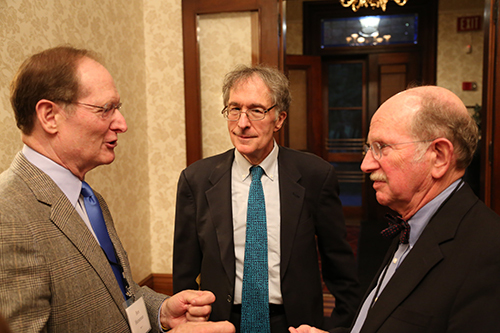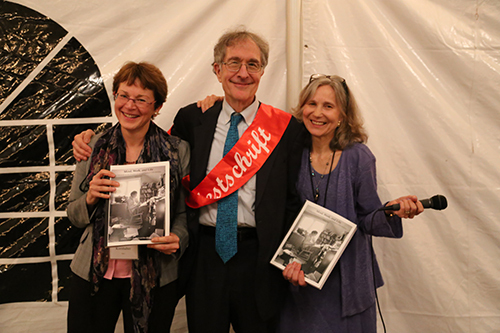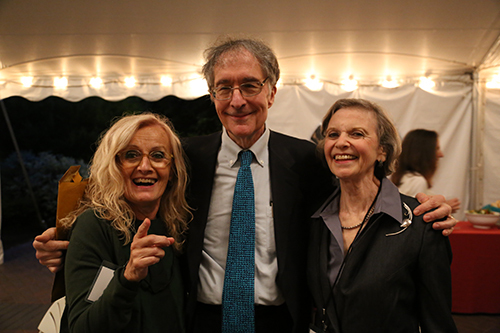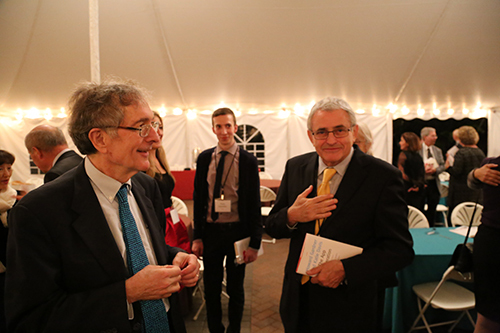To celebrate Howard Gardner's 70th birthday last July 11, 2013, his former student, Mindy Kornhaber, and his wife, Ellen Winner, decided to host a Festschrift in his honor. They invited Howard's teachers, peers, fellow scholars, and former students to contribute essays. One hundred and sixteen of Howard's close colleagues created essays inspired by their work and relationships with him. Upon reading these essays, Gardner decided to respond to each one. The result, Mind, Work, and Life: A Festschrift on the Occasion of Howard Gardner's 70th Birthday, is a unique and remarkable record and gift. One year later... I invited Howard, Mindy and Ellen to share their 3 X 5 = 15 Lessons from a Festschrift. It is my pleasure to share their reflections with you today in The Global Search for Education.
Mindy Kornhaber is now an Associate Professor in the College of Education at Pennsylvania State University. Ellen Winner is Professor and Chair of the Psychology Department at Boston College. Howard Gardner is the Hobbs Professor of Cognition and Education at the Harvard Graduate School of Education.
Five Lessons from a Festschrift by Ellen Winner
1. Plan ahead - it's a lot of work.
Mindy and I started this project three years ahead of time, but we really had no idea how much work would be entailed. Compiling the list of people to invite, trying not to overlook anyone (which I'm sure we did) - that was already a very large organizational task. And then there was the task of editing each entry, which Mindy and I did in a back and forth manner. Thank god for email. So lesson number 1: start way way ahead!
2. Don't do it the usual way.
Festschrifts usually contain only scholarly essays. We told people that they could write a scholarly essay or a purely personal one about their relationship to Howard, but if they chose to write a scholarly essay, that too should include information about their relationship (personal, intellectual, or both) with Howard. We also deliberately invited people who had worked with Howard in very different roles - from mentors to professional colleagues to students to research assistants. We loved the mix that we got, filled with personal stories, often very funny, and allowing a glimpse into the kind of influence that Howard had not only on those working in similar areas, but also on the students he trained, and the research assistants who learned from him how to work Howard-style in Howard-time.
3. Don't worry about conventional publication.
Of course, if you create a compilation like we did, with 116 entries and with some entries being purely personal and not scholarly writings, you will be unlikely to find a publisher. What made the volume even more unusual is that after we presented the volumes to Howard on September 28, 2013, he decided to answer every contribution, sometimes at length while convalescing from cardiac surgery in the winter of 2014. This is, by the way, Howard's unusual notion of convalescing! Today you don't need a publisher. We published this with Amazon where it can be ordered at little cost in hard or digital copy, and posted it on Howard's website.
4. Don't have a boring formal conference. Instead have a festive dinner peppered with hilarious roasts.
We did not even think about having a conference where people could present their contributions. There were far too many. Instead, we opted for a festive dinner under a tent with great food (Thai and Italian, two of my favorite cuisines) and often very funny roasts of Howard, including from all four children and one grandchild.
5. Keep at least something secret from the honoree.
Howard knew we were working on this but we kept the contributions secret from him until we presented him with the volumes. We also kept something else secret from him. We did not tell him that one of the contributors, neuropsychologist Edgar Zurif, who now lives in France, and with whom Howard shared an office and many grants at the VA hospital at the beginning of his career, was actually going to fly in for this dinner, with his wife Francoise. I told Howard that he had to be home on the morning of the dinner because photographers were coming over. I wanted to make sure he did not suddenly decide he had to go to his office. I told Edgar and Francoise to ring the doorbell at an appointed time. They did. I told Howard to go open the door for the photographers. He did. He stared at Edgar and Francoise and turned to me and said under his breath, "These don't look like photographers." Then he turned back and looked again. And of course he recognized Edgar and Francoise, and everybody hugged and Howard was so moved that tears came to his eyes. That moment, memorialized by photos by Kerith Gardner, was absolutely joyous.

"Only a mensch like Howard -- whose interactions with others are driven by integrity and care v. instrumentality -- can inspire such a network to produce truly great writing and thinking in his honor." -- Mindy Kornhaber
Five Lessons for a Festschrift by Mindy Kornhaber
1. I was not an outlier. For 20-plus years, I thought Howard was unusually generous and kind to me in both professional and personal realms. But no! Many contributors to the Festschrift remarked that Howard was unusually generous and kind to them, too. Rather than feeling special, I now feel I'm in good company with many students, educators, and scholars in and beyond the Festschrift.
2. There's networking and then there's menschworking. The Festschrift illustrates that, sure, some individuals swim in large networks of really smart people. However, only a mensch like Howard -- whose interactions with others are driven by integrity and care v. instrumentality -- can inspire such a network to produce truly great writing and thinking in his honor.
3. Compelling work like this Festschrift cures a range of ills. Planning the Festschrift and eyeballing so many stellar contributions served as "my happy project." It eased the drama of our household's college application process. Crafting responses to each contributor helped Howard through a long cold winter spent mostly indoors. Thus, I recommend compelling work to anyone considering artificially altering his/her neurotransmitters.
4. Decorum has its place, but so does over-the-top exuberance. Some contributors produced intellectual tours de force on the nature of teaching, morality, the arts, or intelligence. Others generated poems, pictures, and even personal essays that likened Howard to a rock star and super hero. Both decorous and exuberant contributions did justice to Howard's wonderful head, heart, and sense of humor.
5. Breaking "a form" can generate coherence. Howard's Festschrift defies the traditional form. It has scholarly pieces, five decades of reminiscences, and admixtures of these and other things. Together, the contributions, and Howard's responses to them, allow a multidimensional understanding of how truly remarkable a thinker and human being Howard is.
Five Lessons from a Festthrift by Howard Gardner
l. The incredible dedication of Mindy Kornhaber, my former student, and Ellen Winner, my colleague and wife, who worked on the Festschrift secretly for three years. I was consulted only on sensitive questions. Only my mother was permitted to read the essays before the Festschrift celebration in September 2013.
2. The decision to respond. When I began to read through the 116 contributions, so carefully prepared by scholars, researchers, and former students, I realized that I had to respond thoughtfully to each - they captured uniquely the flavor of scholarly exchanges in our time.
3. The power of the personal. About 10 percent of the essays were purely scholarly, an equal number purely personal. The vast majority were a synthesis. I was unprepared for the effect that I have had as a person on so many contributors. I'd never realized how much of my influence occurred as a consequence of scholarly style - rapid, pointed, and constructive responses to drafts by students and colleagues - and of personal habits - how I organize my day, my memos, my schedule, my personal and professional life.
4. Extending long-standing discussions. A special thrill was the opportunity to read and respond to current views of cherished colleagues. Sometimes, as in the case of Bennett Reimer on musical intelligence, I had the chance to renew a long-standing debate. Sometimes, as in the contribution by Bill Damon and Anne Colby, I encountered expansion of views on human development that we had often discussed. Sometimes, as in the case of Antonio and Hanna Damasio's reflections on the roots of morality, I had the chance to raise new questions.
5. The dialogue goes on. At first, I thought I'd simply post the two volumes on my website. Thanks to a suggestion by Bob Sternberg, the volumes are inexpensively available on Amazon. All interested in the range of topics and views captured in the Festschrift will be able to contribute in their preferred formats. I mourn the passing of four contributors but rejoice that many can continue to reflect on issues raised by those contributors. To paraphrase a Latin expression, "Life is short, yet the discussion of ideas has no end."
For more information: http://howardgardner.com/books/
Special thanks to Andrew Gardner for the photographs from the evening's celebration.
In The Global Search for Education, join me and globally renowned thought leaders including Sir Michael Barber (UK), Dr. Michael Block (U.S.), Dr. Leon Botstein (U.S.), Professor Clay Christensen (U.S.), Dr. Linda Darling-Hammond (U.S.), Dr. Madhav Chavan (India), Professor Michael Fullan (Canada), Professor Howard Gardner (U.S.), Professor Andy Hargreaves (U.S.), Professor Yvonne Hellman (The Netherlands), Professor Kristin Helstad (Norway), Jean Hendrickson (U.S.), Professor Rose Hipkins (New Zealand), Professor Cornelia Hoogland (Canada), Honourable Jeff Johnson (Canada), Mme. Chantal Kaufmann (Belgium), Dr. Eija Kauppinen (Finland), State Secretary Tapio Kosunen (Finland), Professor Dominique Lafontaine (Belgium), Professor Hugh Lauder (UK), Professor Ben Levin (Canada), Lord Ken Macdonald (UK), Professor Barry McGaw (Australia), Shiv Nadar (India), Professor R. Natarajan (India), Dr. Pak Tee Ng (Singapore), Dr. Denise Pope (US), Sridhar Rajagopalan (India), Dr. Diane Ravitch (U.S.), Richard Wilson Riley (U.S.), Sir Ken Robinson (UK), Professor Pasi Sahlberg (Finland), Professor Manabu Sato (Japan), Andreas Schleicher (PISA, OECD), Dr. Anthony Seldon (UK), Dr. David Shaffer (U.S.), Dr. Kirsten Sivesind (Norway), Chancellor Stephen Spahn (U.S.), Yves Theze (Lycee Francais U.S.), Professor Charles Ungerleider (Canada), Professor Tony Wagner (U.S.), Sir David Watson (UK), Professor Dylan Wiliam (UK), Dr. Mark Wormald (UK), Professor Theo Wubbels (The Netherlands), Professor Michael Young (UK), and Professor Minxuan Zhang (China) as they explore the big picture education questions that all nations face today.
The Global Search for Education Community Page
C. M. Rubin is the author of two widely read online series for which she received a 2011 Upton Sinclair award, "The Global Search for Education" and "How Will We Read?" She is also the author of three bestselling books, including The Real Alice in Wonderland, is the publisher of CMRubinWorld, and is a Disruptor Foundation Fellow.




